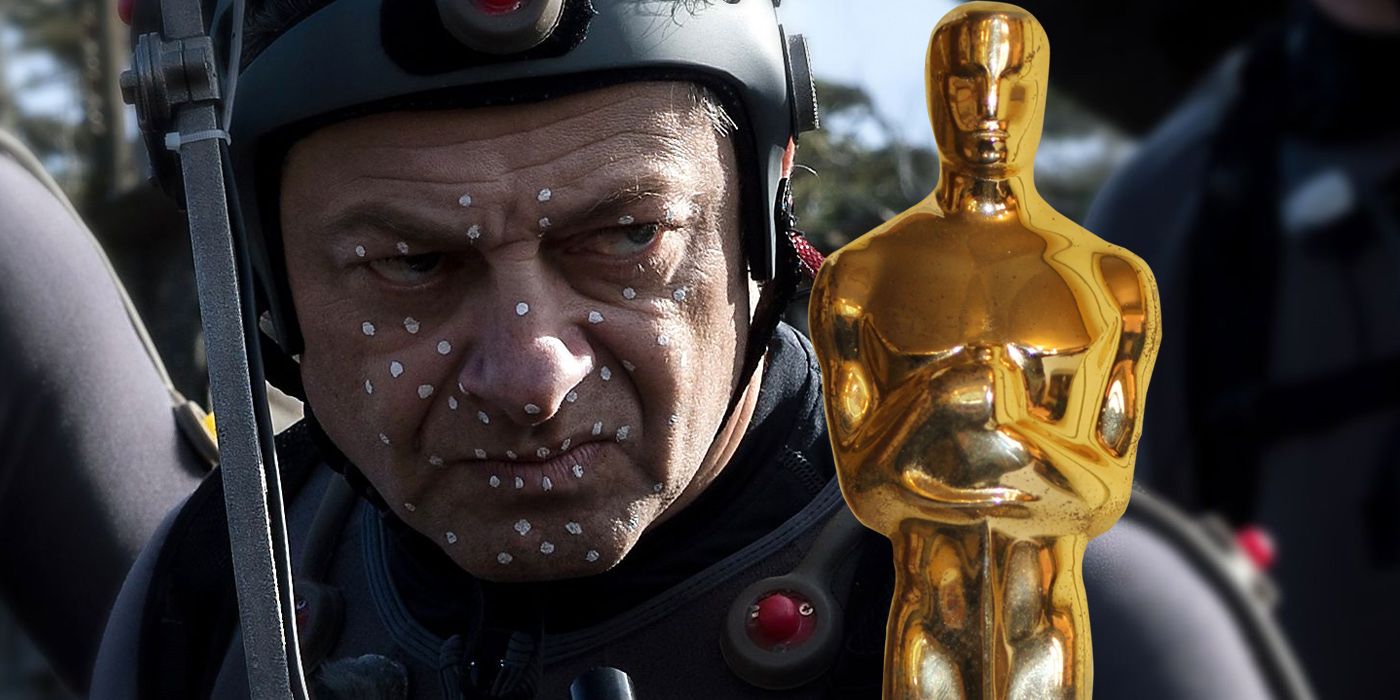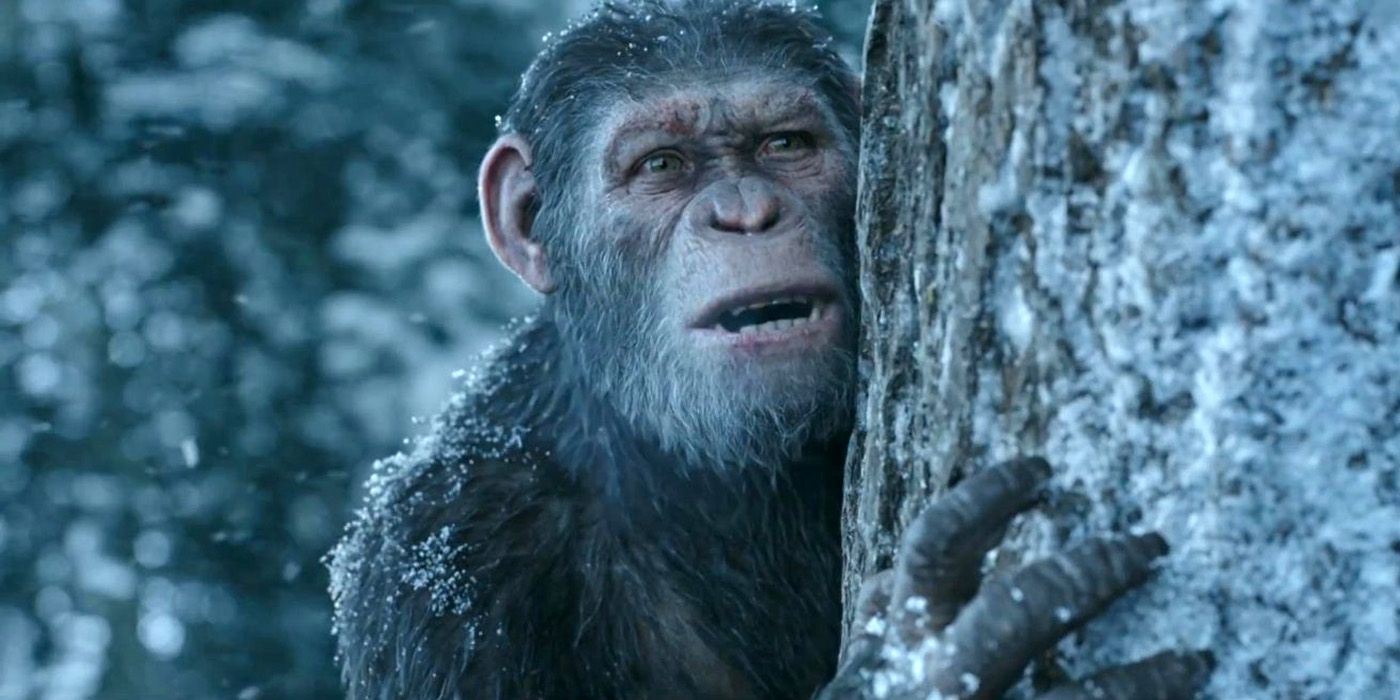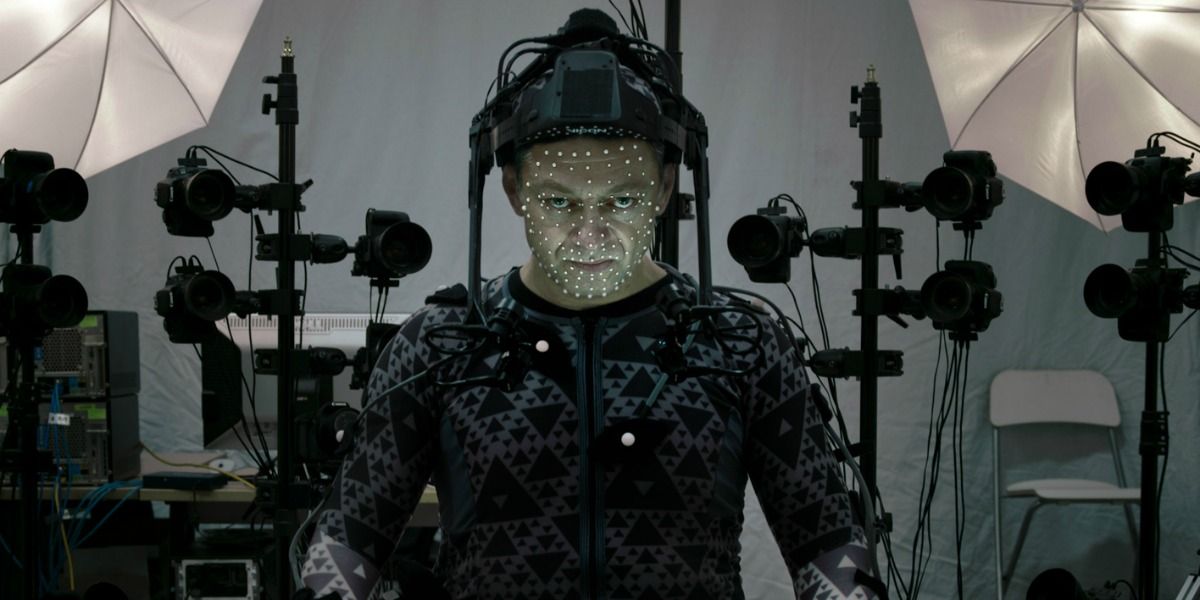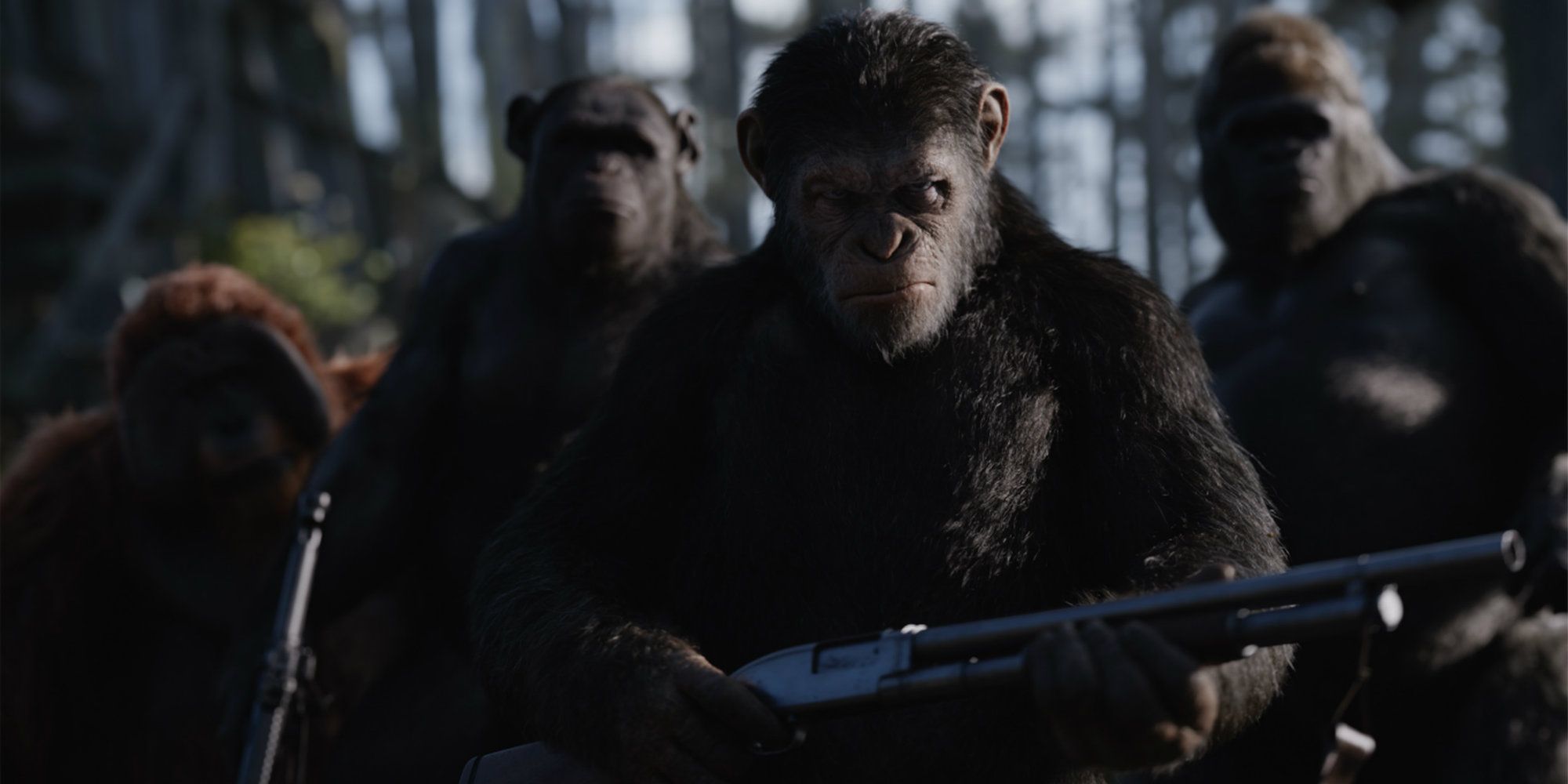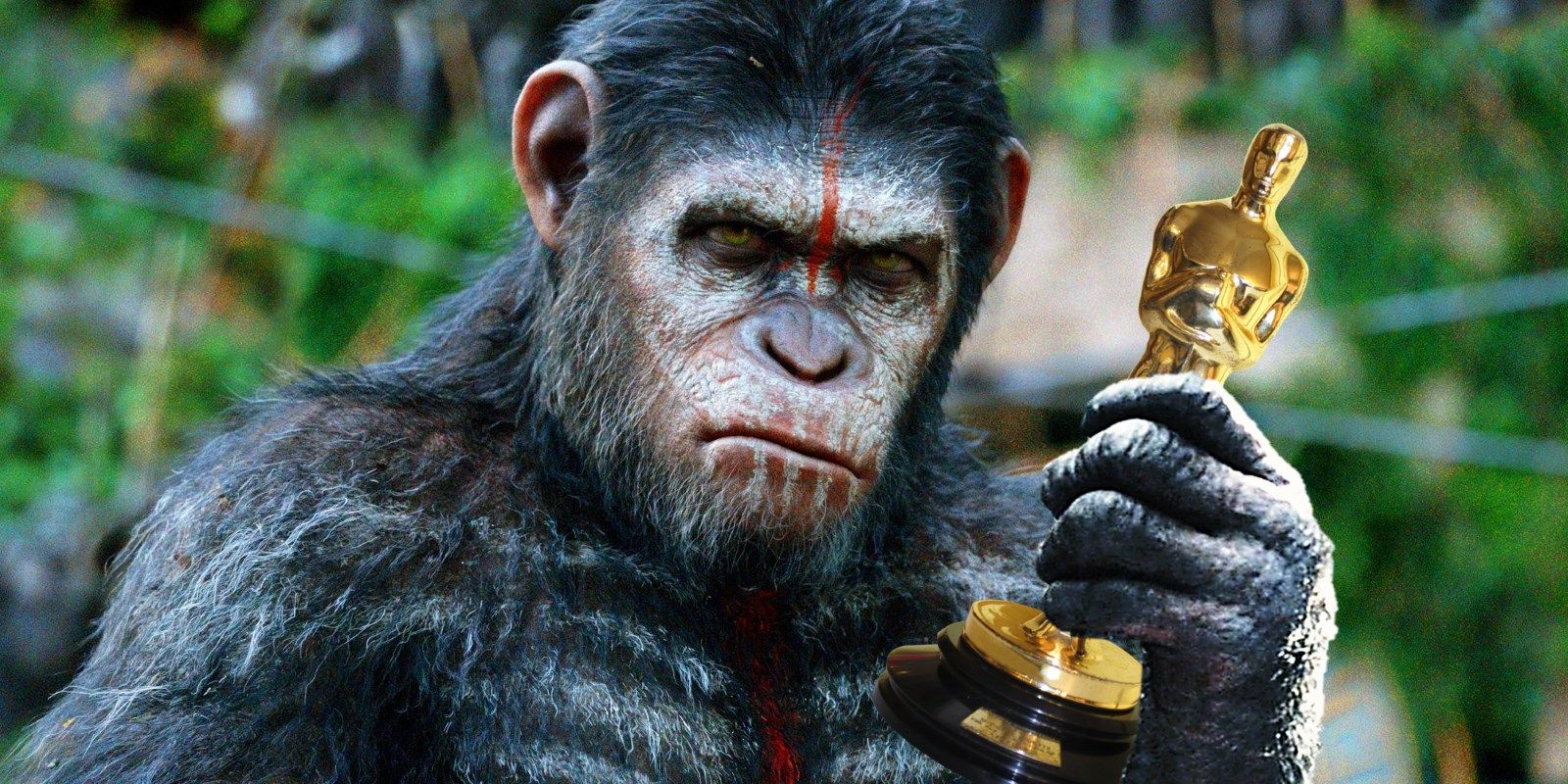With the release of War for the Planet of the Apes and yet another transformative motion-capture performance from Andy Serkis, it's time to admit the unsettling truth - he's never going to win an Oscar for his talents. Every time a film with a nuanced mo-cap turn from a named actor is released, the same discussion whirs up: when will the Academy recognize this new form of acting? This is doubly true with Serkis, who from his groundbreaking work on Gollum in The Lord of the Rings through to envelope-pushing nuance of Caesar in Planet of the Apes has become the undisputed heavyweight of the form; he's the person everyone, from Peter Jackson to Marvel, goes to when trying to understand how to digitally capture and render a performance.
He's so dominant that the dependable speculation that this movie might be the one to break the Academy's snubbing or otherwise force them to introduce a special catergory comes like clockwork. However - sorry - with Serkis' ninth major mo-cap turn, it's time to admit that it just isn't going to happen for him.
Why Andy Serkis Deserves An Oscar
Let's not create any wrong impression here - Serkis 100% deserves an Oscar. His performances are more involved, more intricate, and more emotive than many turns that get nominated or even win. But beyond raw ability, he's also immensely deserving. The Oscar's bow to narrative - look at Leonardo DiCaprio's win for The Revenant - and that's what you have with Serkis. He wasn't the first actor to do full mo-cap but he was the one who showed what it offered in comparison to standard performances and perfected the form. Even his lesser turns - Snoke in Star Wars: The Force Awakens is yet to justify his lofty status - he's still fully in the role. And he's taught so many others; he's pretty much Caesar, leading his woke followers.
The crown jewel is indeed Apes. His Gollum is certainly the most iconic and striking, but if you're taking in the full range of the performance and how he carries the series, his work as Caesar is on another level. He plays him literally from cradle to grave, imbuing each step from wonder-filled child to beaten prisoner to reluctant revolutionary to conflicted leader to family man to worn general to vengeful fighter to content protector with purpose and unique worldview. The breadth of character he gets to explore across just three films is pretty much unheard of and more than makes up for any narrative flubs along the way; he is Caesar.
You couldn't do such a performance without mo-cap - the level of intimacy it allows eclipses makeup - but you could certainly do a shoddy representation of that arc with it. Serkis is constantly in control as Caesar becomes less typically "chimp-like". In fact, once we get a melding of ape and human styles he somehow just gets better; in War he falls even more into the ape than before, telling a heartbreaking revenge-redemption tale.
In an ideal world, he'd be a shoe-in for a Best Actor nom on his efforts in this one film alone and, barring a similarly astounding performance was another lifetimer, he'd be on the stage of the Dolby Theater on 4 March 2018. But this is not a perfect world.
Next Page: [valnet-url-page page=2 paginated=0 text='Why%20Serkis%20Won%27t%20Win%20An%20Oscar']
Why Serkis Won't Win An Oscar
The basic debate of whether a motion capture performance can be eligible for an acting Oscar - and if people will then vote for it - hinges on how much of the digital creation on screen comes from the actor and how much the VFX artist. And while you can show videos where everything is perfectly transferred, the fact still remains that an animator oversees a high amount and can make adjustments at will. This begs the question, what is the relation between actor and CGI compared to actor and prosthetics? And beyond that, how do we measure a performance in general? To honor mo-cap requires a shift in thinking.
Now, the Oscars have changed a lot in recent years. Just fifteen years ago, Oscar bait was king and Harvey Weinstein was able to get mainstream fare masquerading as art-house - see Shakespeare in Love and The King's Speech - the big prize with nothing but a brute force marketing campaign (while it wasn't him, the same is true of Crash). But recently there's been a shift. The fact that Weinstein hasn't been able to get a film to win since Speech in 2011 is telling, but so is the rise of unconventional non-favorites going to distance; Spotlight beat out The Revenant and Moonlight (eventually) won over La La Land, a film that tied for most nominations and was on paper an ideal awards scooper. The reasons for this are plentiful - it may be an unexpected repercussion of the expanded Best Picture nominee set, originally done to help integrate blockbusters but instead helping more subtle fare - and now the Academy is shifting its membership rules is only going to continue.
However, while we've seen Best Picture change, developments are more static in the other categories, especially when it comes to acting. While we've seen a direct reaction to #OscarsSoWhite recently, the type of performances that get recognized are still the same prestige turns: typically dramatic and usually in very character-driven movies. There's definitely nothing wrong with this style of acting, but a constant focus on them is hardly the most diverse approach.
But, for now, that's how it is and even with those membership additions that focus isn't going to move. Actors alone vote for Best Actor and so reward the things they would like to see themselves doing. Many are appreciative of mo-cap, but as it's a more collaborative form of performance capture it could also be seen as a threat and the voting pool are thus perceived as less likely to give it a real thought. There's been next to no movement in this regard; even when Serkis has been nominated for previous Apes films by genre awards like Saturn or certain Film Critic societies, it's as a Supporting Actor, showing some form of reluctance to pin all the praise on him.
And all of this ignores a more ingrained problem: mo-cap performances are in sci-fi blockbusters. Occasionally you see a summer tentpole or box office smash work through the strong barriers against big budget or genre films - District 9, Avatar, Inception and Mad Max: Fury Road have all been nominated for Best Picture in recent years - but even then they are usually recognized on a more technical standpoint than acting; Avatar and Mad Max got 9 and 10 nominations respectively, yet none of those were for acting. In fact, the only recently recorded win from such a film is Heath Ledger's posthumous Best Supporting Actor win for The Dark Knight; we've seen Ian McKellen and Johnny Depp get noms in the past for The Lord of the Rings: The Fellowship of the Ring and Pirates of the Caribbean: The Curse of the Black Pearl respectively, yet they were never in with a shot of winning.
Serkis is yet to get close to even a nomination at the Oscars. Proper campaigns have been ran by Fox on both previous Apes prequels, so there is movement in the industry, but it's yet to have any concerted impact. At this point, it feels like he has simply too many barriers to smash through to even get into contention - and being able to transfer that into a practical win against four more conservative choices amongst a more traditional voting selection is going to be very tough regardless. If an actor ever does win an Oscar for a mo-cap turn, the progress taken to get there may mean it's well after Serkis has retired.
Next Page: [valnet-url-page page=3 paginated=0 text='Will%20They%20Introduce%20A%20New%20Category%3F']
Will They Introduce A New Category?
A popular alternative to the claims for a mo-cap win is to for the Academy to simply bite the bullet and introduce a Best Motion-Capture Performance award, bypassing a pre-existing bias and forcing a reassessment. This regularly tops suggestions for a new category and in terms of Academy relevance would definitely honor the most pertinent advancement in the medium this century.
However, it's not clear if we're at the point for this to be viable. Whereas when the Best Animated Feature award was added in 2001 Pixar's impact had spawned its own massive subsection of the industry, now there just doesn't seem to be enough mo-cap performances, at least not to provide the required diversity. And if you look at how that award is often used as a way to ghetto cartoons, it may actually wind up being a step back.
There's also the question of what exactly is motion-capture. This method has been present in cinema from its very early days - it was how Walt Disney animated his early films, drawing over real actors - and rears its head today in various forms; Sharlto Copley's performance as Chappie was a rudimentary version of the high-tech work we're used to from Weta, and many performances are a mix. With CGI body doubles incredibly common, the question goes beyond mo-cap (Eddie Redmayne's Oscar-winning hand shaking in The Theory of Everything was CGI), but it's at the forefront here and some formalization would be required lest we get mired in dogma.
It's really the same debate at the core of the Best Actor consideration; trying to pin down what exactly defines an acting performance. Until we get to that point, there's no way of really moving forward.
An Academy Honorary Award Is The Best Hope
It would be a scandal of the highest order if Andy Serkis never received an Oscar for his mo-cap work. Of course, it's exceedingly possible that he'd wind up getting some recognition for his standard, live-action acting - from Ian Dury in Sex & Drugs & Rock & Roll to his bit-parts in The Prestige and Avengers: Age of Ultron he's proven his versatility is not limited to a leotard and face camera - and if we're talking about honoring long-term impact, this is a way for the Academy body to do that without bending over backwards to legitimize a new form.
And, if not, he needn't "win" to be awarded. The Academy Honorary Award exists to correct just this sort of oversight, allowing them to step in when a career of undeniable importance goes overlooked. Perhaps most pertinently Peter O'Toole, who was nominated seven times without a win, had his record-breaking drought fixed by this in 2002, while the past few years have seen many comparable to Serkis gain attention - Hayao Miyazaki, Jackie Chan and Steve Martin to name just three. While this won't be quite the same, it would be a more than worthy achievement.
-
This isn't meant to be a disrespectful takedown of Serkis or intended to neuter any real hope he may have of eventually bagging the biggest prize. We just want to say - while he's deserving - it's simply not prudent to be making such optimistic claims when the state of the industry, Oscars and medium feel presently too antiquated to recognize his true talent and worth. Prove us wrong, Academy.

